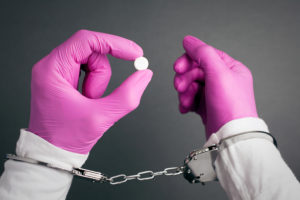
One problem with such a system might be the ability for users to opt out of the system — that is, to simply ignore the established, “legitimate” route for obtaining drugs and to obtain them instead from black market sources. For example, if the only dose of methamphetamine that could be purchased legally were one that provided a few hours of stimulation but not the days-long, teeth-grinding rush that some people crave, the serious meth aficionado might prefer to buy the “unapproved” version of the drug from an illicit source. Or, even more likely, the aficionado might buy multiple doses of the drug and take them simultaneously, in much the same way that people now engage in “smurfing” to buy enough pseudoephedrine to cook up methamphetamine.
Opting out might seem to be the Achilles heel of any system that uses regulated markets to control drugs. If you can’t forceeverybody to comply with a regulatory scheme, after all, it’s safe to bet that some people will choose not to do so. Those people will expose themselves to dangerous drug use, will overdose from time to time, and will engage in some of the dangerous behaviors we already associate with the use of illicit drugs. Given that some people will probably opt out, then, could a regulated market ever be effective?
Probably so — at least compared with the alternatives. The behavior of people who would opt out of a regulated market system suggests that such a system isn’t flawless, but no real-world system is flawless, and our current criminal justice regime is hardly without its drawbacks. In fact, the entireproblem of criminal drug regulation at the moment consists of trying to control the behavior of people who have “opted out” of our society’s wholesale prohibition of certain drugs.
Opting out, in and of itself, doesn’t prove that a regulated market system is broken. In the prescription drug context, manufacturers and doctors already “opt out” of FDA regulation by engaging in “off label” prescription of drugs for unapproved purposes, and some consumers “opt out” of the intended use of prescription drugs by using them recreationally or abusively, but this does not diminish the overall value of FDA oversight.
Similarly, the fact that some people engage in binge drinking of alcohol doesn’t mean that their decision to “opt out” of our societal presumptions around alcohol consumption renders those presumptions misguided. Nor does the fact that kids occasionally get alcohol or that there is black market trafficking in alcohol mean that the regulatory system around alcohol is useless or broken. “Opting out” happens, and it’s not the end of the world. The regulatory system we have in place around alcohol is still a vast improvement over the prohibition regime that was in place under the 18th Amendment in the early part of the 20th century. Similarly, if some people were to opt out of a regulated market system for drug regulation, that wouldn’t undercut the fact that most people operated within the limits of the system and that the system as a whole was more effective than a model based on the criminal justice model. But the trick, as always, would be to sell that idea to the public and to politicians. There again, the example of alcohol proves that attitudes can indeed change over time.